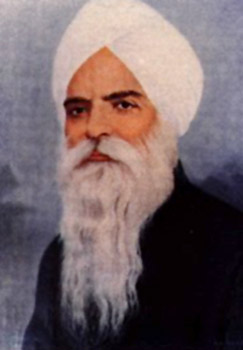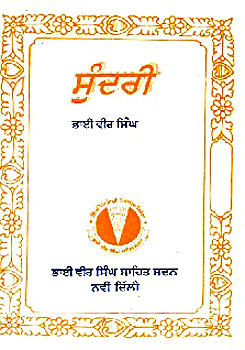 Bhai Vir Singh (1872-1957) was a Punjabi writer who was part of the Singh Sabha movement. The Singh Sabha movement propagated the message of the Sikh gurus and initiated a movement to reform the religious and ethical life of the Sikhs. It also made efforts to develop the Punjabi literature and language. Essentially, the Sabha wanted to establish a separate cultural identity for the Sikhs. Bhai Vir Singh was the chief exponent of the Sabha. He was committed to the use of literature to forge a Punjabi cultural identity.
Bhai Vir Singh (1872-1957) was a Punjabi writer who was part of the Singh Sabha movement. The Singh Sabha movement propagated the message of the Sikh gurus and initiated a movement to reform the religious and ethical life of the Sikhs. It also made efforts to develop the Punjabi literature and language. Essentially, the Sabha wanted to establish a separate cultural identity for the Sikhs. Bhai Vir Singh was the chief exponent of the Sabha. He was committed to the use of literature to forge a Punjabi cultural identity.
Bhai Vir Singh contributed significantly to the understanding of Sikhism by the Sikh masses. Moreover, he established a distinct literary tradition, both in the literary and in the ethical or social-historical sense. He wrote fiction, poetry, prose of ideas, and learned commentaries on the old sacred texts. He also wrote tracts and launched a weekly in Punjabi, Khalsa Smachar, in order to propagate and disseminate the teachings of the Sikh gurus and to restore Sikhism to its traditional glory. He wrote semi-novels to depict the most trying conditions for the Sikhs when they were being persecuted by the Mughal rulers in the latter half of the eighteenth century.
 His first three novels, Sundari (1898), Bijay Singh (1899), and Satwant Kaur (1900), deal with the theme of Sikh courage and chivalry in their battles against the local Mughal chieftains and also against foreign Pathan invaders from Kabul, who would return after loot and plunder from Punjab. In Baba Naudh Singh (1921), he epitomizes the highest virtues of a Sikh. It seeks to portray the ideal character of a Sikh who has imbibed the true teachings of the Sikh gurus and who, through his conduct, reforms the religious life of all those who come into contact with him. The characters of these novels became household figures in Sikh homes for several years. Bhai Vir Singh`s fictional writings, which are more like historical romances, serve a special purpose, which he had predetermined. He tried to present the image of Sikhs as men without hate, without fear, always at the service of the people, ever ready to fight for noble causes. In his hands, the story, therefore, was merely a vehicle to throw light on the various social customs and religious beliefs of the Sikhs.
His first three novels, Sundari (1898), Bijay Singh (1899), and Satwant Kaur (1900), deal with the theme of Sikh courage and chivalry in their battles against the local Mughal chieftains and also against foreign Pathan invaders from Kabul, who would return after loot and plunder from Punjab. In Baba Naudh Singh (1921), he epitomizes the highest virtues of a Sikh. It seeks to portray the ideal character of a Sikh who has imbibed the true teachings of the Sikh gurus and who, through his conduct, reforms the religious life of all those who come into contact with him. The characters of these novels became household figures in Sikh homes for several years. Bhai Vir Singh`s fictional writings, which are more like historical romances, serve a special purpose, which he had predetermined. He tried to present the image of Sikhs as men without hate, without fear, always at the service of the people, ever ready to fight for noble causes. In his hands, the story, therefore, was merely a vehicle to throw light on the various social customs and religious beliefs of the Sikhs.
Bhai Vir Singh`s poetry is deemed his major contribution to Punjabi literature. Though much of his poetry is essentially religious in content, he introduced new themes in his poems that did not conform to the known models of the past. His poetry works include Rana Surat Singh (1905), Lehran de Har (1907-21), Matak Hulare (1920), and Bijlian de Har (1922-27). His Mere Sayian Jio (1953), the final volume of his poems, won the Sahitya Academy Award in 1955, two years after his death. His poetry portrays the longing for a mystic union. In his long poem Rana Surat Singh, written in blank verse, the poet attempts a search for an inner composure, tranquility, and freedom from anxiety through Sikh spirituality. Bhai Vir Singh`s poetry achieves the sublime height of mysticism. Every poem is steeped in the love of the Supreme Being, to which he gives expression in different metaphors, such as lightning suffusing spheres, a river merging into the sea, and an ever-moving brook seeking its beloved Lord.
Bhai Vir Singh also made a splendid contribution in the scholarship as well as the development and understanding of the Sikh scriptures. He edited and annotated Guru Pratap Suraj Granth (1926-33) and completed the compilation of Guru Granth Kosh (1927). It was followed by a biography of Bhai Gurdas (1940) and Asht Guru Chamtkar (1951).
Thus Bhai Vir Singh in his lifetime assumed the role of father figure of twentieth-century Punjabi literature and won universal admiration. In recognition of his services to Punjabi life and letters, he was conferred the degree of Oriental learning honoris causa by the Punjab University in 1949 and was nominated to the Punjab Legislative Council in 1952. He was also nominated to the National Academy of Letters in 1954, thus achieving national eminence. He was a powerful influence on other writers to follow, such as Bhai Kahan Singh Nabha, Mohan Singh Vaid, Charan Singh Shaheed, Dhani Ram Chatrik, Puran Singh, Balbir Singh, and Bhai Jodh Singh.



















